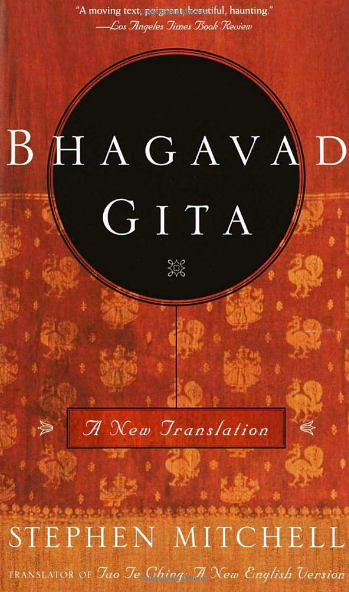“The mind is restless, unsteady, turbulent, wild, stubborn,” it says in The Bhagavad Gita, the sixth book of the Mahabharata, one of India’s most famous ancient poems. “Truly, it seems to me as hard to master as the wind.”
Reminiscent of what the great Stoic philosopher Marcus Aurelius said about the importance of disciplining the mind, and what the Dalai Lama has said about overturning the negative tendencies of the mind, The Bhagavad Gita speaks to the propensity of the mind to lead us astray, enslaving us in patterns of thoughts, actions and behaviors that undermine our ability to live full, joyous lives.
Indeed, it is only by “confronting, with a rude shock, the selfishness and obstinacy of the raw mind”, as translator Stephen Mitchell states in the introduction to the Gita, that we can learn to break free from destructive tendencies.
Mitchell writes:
“Any genuine path will, with sincere practice, result in a gradual, deepening surrender of selfishness into the ultimate reality that the Gita calls the Self. Just as our primordial craving leads to all the manifold forms of our misery, letting go of our ideas about reality and our desires for particular results leads to freedom.”
Translated as “The Song of the Blessed One” and originally written as a 700-verse Sanskrit scripture, the Gita recounts a dialogue between Arjuna, one of five Pandava princes, and the Hindu deity Krishna, as he prepares to go into battle.
Its beauty is found in its widespread appeal, speaking to people of various faiths and backgrounds, ultimately offering fundamental truths on human existence and challenging us to aim for our highest, truest self.
As Mitchell explains in the introduction:
“The Gita is a love song to reality, a hymn in praise of everything excellent and beautiful and brave. It is a love song to both the darkness and the light, to our own true Self in the depths of being, the core from which all the glories and honors of the universe unfold.”
[…]
“…[it] is a book of deeply personal instruction. When you approach it as a sacred text, you can’t help standing, at first, in the place where Arjuna stands, confused and eager for illumination. Whatever intellectual or esthetic satisfaction it may provide, its purpose is to transform your life.”
Please note: While the Gita is certainly not a Christian text and the ‘God’/’Lord’/’Me’ it references is not the Christian God, I have taken the liberty of applying it as such below, for I believe there are significant overlaps. The quotes from the text are spoken by the Hindu deity Krishna.
Wisdom is when we learn to act without expectation of results:
“You have a right to your actions, but never to your actions’ fruits. Act for the action’s sake. And do not be attached to inaction. Self possessed, resolute, act without any thoughts of results, open to success or failure.”
[…]
“The wise man lets go of all results, whether good or bad, and is focused on the action alone.”
[…]
“The wise man whose insight is firm, relinquishing the fruits of action, is freed from the bondage of rebirth and attains the place beyond sorrow.”
Wisdom is learning to master the mind:
“When a man gives us all desires that emerge from the mind, and rests contented in the Self by the Self, he is called a man of firm wisdom.
He whose mind is untroubled by any misfortune, whose craving for pleasures has disappeared, who is free from greed, fear, anger, who is unattached to all things, who neither grieves nor rejoices if good or bad things happen – that man is a man of firm wisdom.”
In other words, wisdom is learning not to ‘attach’ our happiness to certain outcomes:
“When a man has let go of attachments, when his mind is rooted in wisdom, everything he does is worship and his actions all melt away. God is the offering, God is the offered, poured out by God; God is attained by all those who see God in every action.”
[…]
“He who is unattached, who is not disturbed by the gunas [“tamas”, which is darkness & chaos; “rajas”, which is activity & passion; and “sattva”, which is beingness & harmony], who is firmly rooted and knows that only the gunas are acting, who is equally self-contained in pain or pleasure, in happiness or sorrow, who is content with whatever happens, who sees dirt, rocks, and gold as equal, who is unperturbed amid praise or blame of himself, indifferent to honor and to disgrace, serene in success and failure, impartial to friend and foe, unattached to action – that man has gone beyond the three gunas.”
Furthermore, contentment is not based on external circumstances or ‘things’:
“A man unattached to sensations, who finds fulfillment in the Self, whose mind has become pure freedom, attains an imperishable joy.
Pleasures from external objects are wombs of suffering, Arjuna. They have their beginnings and their ends; no wise man seeks joy among them.”
Contentment is found within:
“The man of yoga who is able to overcome, here on earth, the turmoil of desire and anger – that man is truly happy.
He who finds peace and joy and radiance within himself – that man becomes one with God and vanishes into God’s bliss.
The wise man, cleansed of all his sins, who has cut off all separation, who delights in the welfare of all beings, vanishes into God’s bliss.
He who controls his mind and has cut off desire and anger realizes the Self; he knows that God’s bliss is nearer than near.”
The way to peace is through God:
“Knowing me as the enjoyer of all worship, the Lord of all worlds, the dearest friend of all beings, that man gains perfect peace.”
[…]
“The Lord dwells deep in the heart of all beings, by his wondrous power making them all revolve like puppets on a carousel. Devoted to him, Arjuna, take refuge in him alone; by his kindness, you will attain the state of imperishable peace.”
And by surrendering to God:
“Those who realize the essence of duty, who trust me completely and surrender their lives to me – I love them with very great love.”
[…]
“Give up all actions to me; love me above all others; steadfastly keep your mind focused on me alone. Focused on me at all times, you will overcome all obstructions; but if you persist in clinging to the I-sense, then you are lost.”
And by remaining in God:
“The man who sees me in everything and everything within me will not be lost to me, nor will I ever be lost to him. He who is rooted in oneness realizes that I am in every being; wherever he goes, he remains in me.”
And by keeping our focus on God:
“If you focus your mind on me and revere me with all your heart, you will surely come to me; this I promise, because I love you. Relinquishing all your duties, take refuge in me alone. Do not fear: I will free you from the evils of birth and death. He who teaches this primal secret to those who love me has acted with the greatest love and will come to me, beyond doubt.”
[…]
“Therefore, Arjuna, meditate on me at all times, and fight; with your whole mind intent on me, you will come to me – never doubt it.”
For He dwells within:
“Under my guidance, Nature brings forth all beings, all things animate or inanimate, and sets the whole universe in motion. Foolish people despise me in the human form that I take, blind to my true nature as the Lord of all life and death. Their hopes and actions are vain, their knowledge is sheer delusion; turning from the light, the fall into cruelty, selfishness, greed. But the truly wise, Arjuna, who dive deep into themselves, fearless, one-pointed, know me as the inexhaustible source.”
[…]
“He who has let go of hatred, who treats all beings with kindness and compassion, who is always serene, unmoved by pain or pleasure, free of the ‘I’ and ‘mine,’ self-controlled, firm and patient, his whole mind focused on me – that man is the one I love best. He who neither disturbs the world nor is disturbed by it, who is free of all joy, fear, envy – that man is the one I love best. He who is purse, impartial, skilled, unworried, calm, selfless in all undertakings – that man is the one I love best.”
Considered one of the world’s most important religious poems, scholars believe The Bhagavad Gita was written anywhere between 400 BCE to 200 CE.
The Gita has influenced many Western writers, thinkers and yogis throughout the ages, including Ralph Waldo Emerson, who mentioned the Gita often in his journals, writing: “It was the first of books; it was as if an empire spake to us, nothing small or unworthy but large, serene, consistent, the voice of an old intelligence which in another age & climate had pondered & thus disposed of the same questions which exercise us.”
Similar posts:
- Think Carefully: Marcus Aurelius on How to Control the Mind
- Epictetus on How to Live a Good, Fulfilling Life
- The Dalai Lama and Archbishop Desmond Tutu on the Four Qualities of the Mind that Lead to Joyful Living
- Saint Augustine on the Happy Life and Finding Joy
- Gisele Bündchen on Self-Awareness, Challenging Your Thoughts and Paying Attention to Your Inner Voice
- Claiming Responsibility for Our Lives: Thomas Merton on Discovering Meaning and Purpose Within


